How HUPD, City Police Departments Worked Together to Monitor Pro-Palestine Protests
More than 300 pages of emails obtained by The Crimson via a public records request show how the Harvard University and Cambridge Police Departments alerted each other to protest activity in the months following Oct. 7.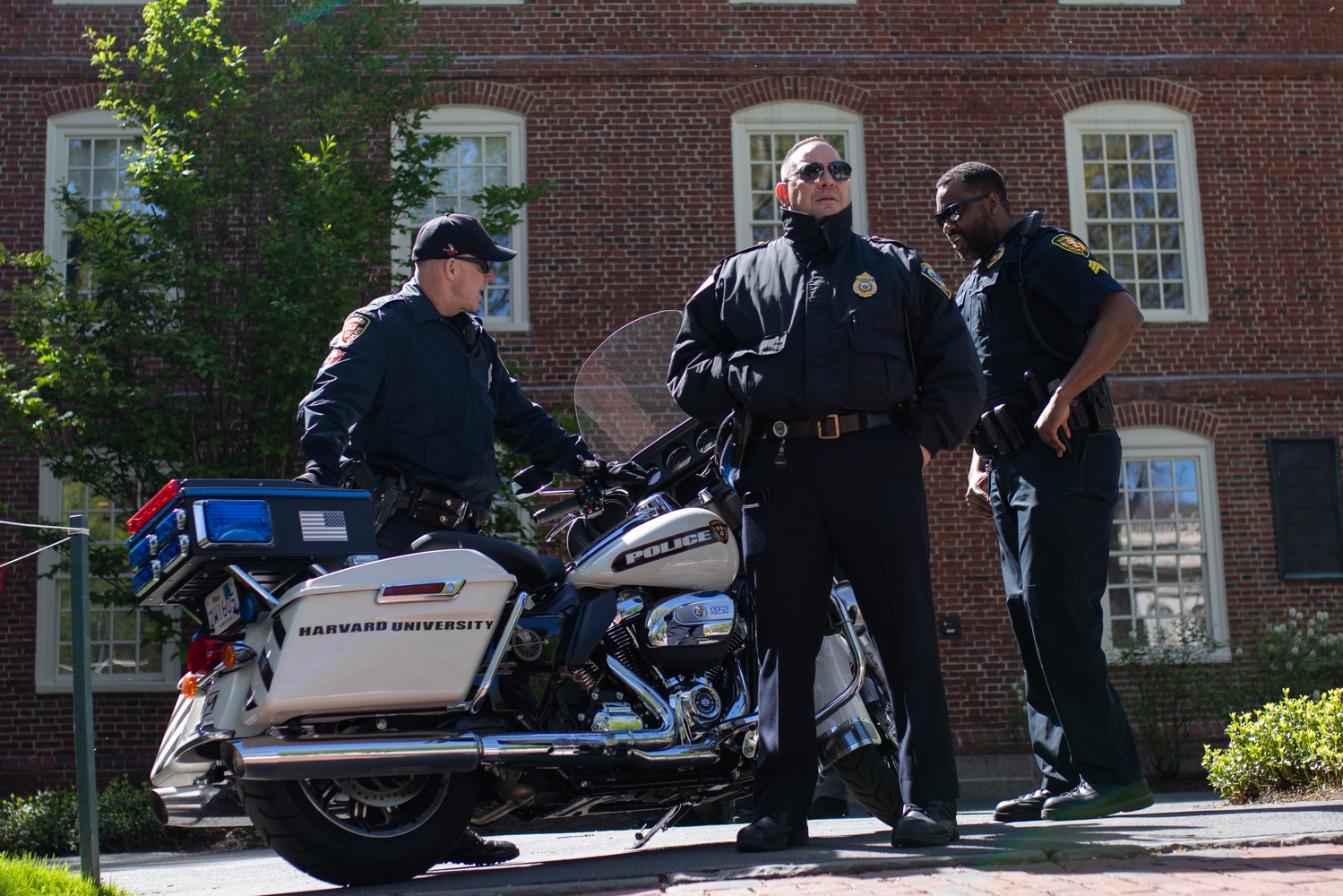
How HUPD, City Police Departments Worked Together to Monitor Pro-Palestine Protests
More than 300 pages of emails obtained by The Crimson via a public records request show how the Harvard University and Cambridge Police Departments alerted each other to protest activity in the months following Oct. 7.The Harvard University Police Department routinely collaborated with other local police forces to monitor pro-Palestine protests near Harvard’s campus, according to emails obtained by The Crimson through a public records request.
The emails, which document the extensive exchange of information between HUPD and its municipal counterparts, show that HUPD and the Cambridge Police Department corresponded about 32 anticipated demonstrations — including 23 pro-Palestine actions — between Oct. 7, 2023, and Aug. 29, 2024. HUPD officials regularly forwarded screenshots of Harvard activist groups’ social media posts to CPD.
The Boston Regional Intelligence Center — an arm of the Boston Police Department that gathers intelligence on suspected crime, gang, and terrorist activity — sent CPD and HUPD information regarding the estimated crowd size, the likelihood of counter protesters, and potential threats of violence for at least four pro-Palestine events in the past year.
BRIC did not respond to a request for comment on the nature of their collaboration with HUPD.
The Crimson received more than 330 pages of emails in response to its request for communications between HUPD or Harvard administrators with CPD from Oct. 7, 2023, through Aug. 29 regarding protests, surveillance, and thefts involving Harvard. From that period, 16 emails were withheld because they relate to an ongoing investigation.
The emails show that HUPD and other local police departments frequently alerted each other to planned protests. Over the past year, that correspondence was dominated by responses to pro-Palestine demonstrations — including through the formation of an “Encampment Working Group” to address the pro-Palestine occupation of Harvard Yard last spring.
Student activists at Harvard have repeatedly accused the University of surveilling pro-Palestine activities. In May, during the pro-Palestine encampment in Harvard Yard, the Harvard Graduate Students Union-United Auto Workers alleged in a National Labor Relations Board filing that Harvard had improperly surveilled members for engaging in protected protest activity.
But representatives of HUPD and CPD wrote in emailed statements that their collaboration in monitoring protests fell within typical practices.
HUPD spokesperson Steven G. Catalano wrote that the department routinely works with neighboring departments “for a number of reasons, including to coordinate efforts, share resources where necessary, and align strategies that advance public safety for everyone.”
“Harvard University Police Department is committed to providing a safe and secure campus, so that our community can attend class, conduct research, engage in our work, and otherwise participate in the life of the University while respecting and protecting the expression rights that are critical to an academic community,” he wrote.
CPD spokesperson Robert Goulston wrote in a statement to The Crimson that the department “has been managing protests regularly since the Israel-Hamas War broke out in 2023, including assisting our partners at major universities where there have also been protests.”
‘In Case Things Go Wrong’
Hamas’ Oct. 7, 2023, attack on Israel left Harvard divided and grieving. Students saw their peers’ faces on doxxing trucks circling Harvard Yard, planes flew overhead with provocative banners, and University officials struggled to respond as affiliates took sides in an incendiary international debate.
HUPD and local police forces worried the situation was a tinderbox. Fall 2023 emails show that on at least two occasions, HUPD and CPD corresponded about the possibility that tensions between pro-Israel and pro-Palestine protesters could escalate into physical confrontations.
On Oct. 10, BRIC — the BPD’s intelligence arm — emailed HUPD and CPD leaders information about a planned meeting of J Street U and Harvard Hillel students after a pro-Palestine vigil at the Science Center.
Although BRIC noted that there were no plans by Hillel students to counter-protest or otherwise engage with the pro-Palestine event, they wrote that they communicated the information for “situational awareness given the proximity in time and space to a large rally with opposing views.”
“Due to the emotionally charged nature of this issue, it is assessed that physical confrontations are possible at events related to this issue if individuals with opposing views are allowed to interact,” the email read.
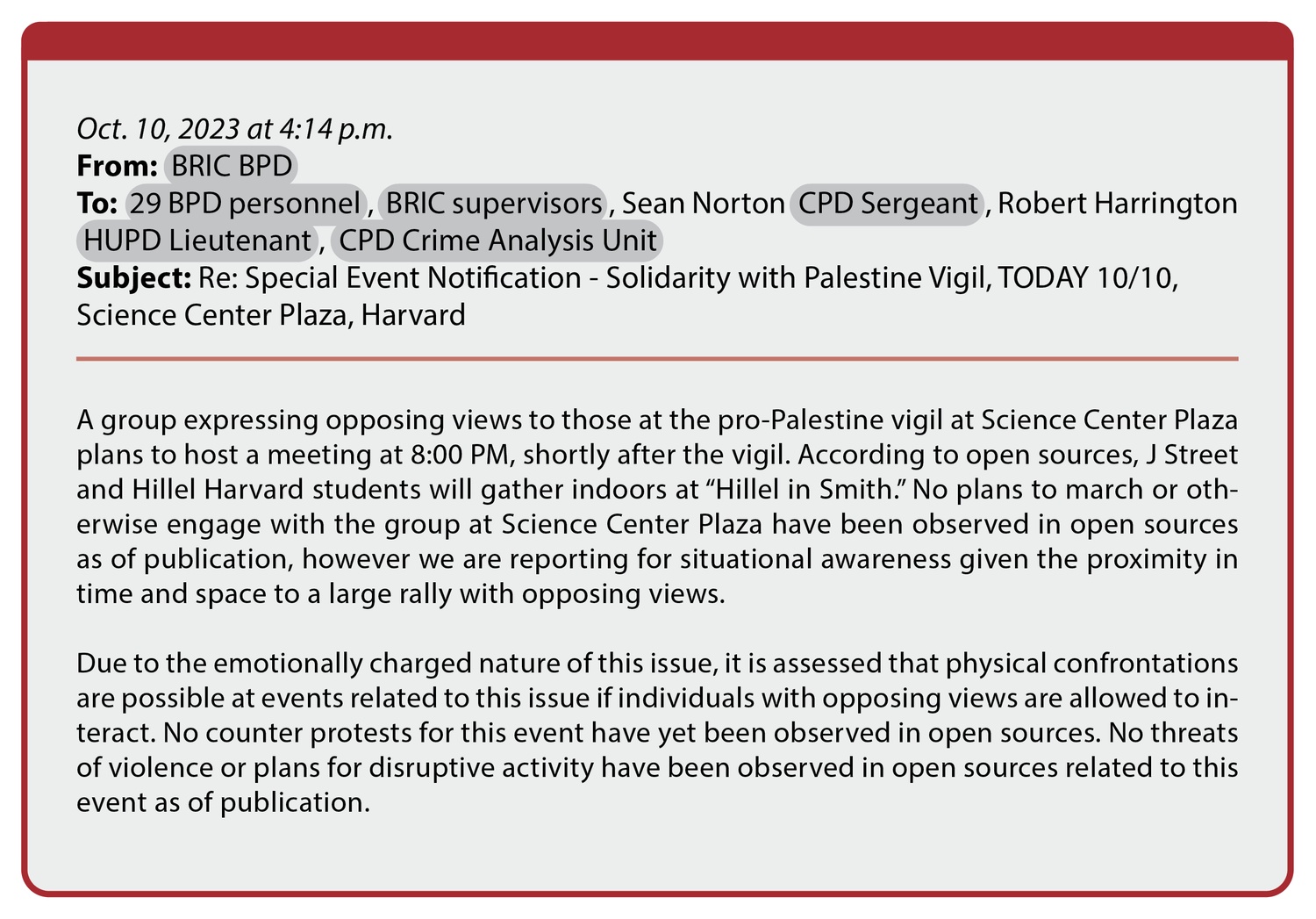
In another email, BRIC wrote that the situation was complicated by “tense and elevated” rhetoric on social media.
The BRIC emails, including an update on the vigil’s rescheduling, were forwarded to Cambridge Police Commissioner Christine A. Elow and HUPD Chief Victor A. Clay.
BRIC corresponded with HUPD again in mid-July about three events they flagged as potentially having “an impact to public safety planning purposes,” including a Rally for Palestine in the Science Center Plaza, a picket protest outside of Elbit Systems — a subsidiary of an Israel-based defense contractor — and an overnight vigil outside Elbit.
The documents provided to The Crimson do not include correspondence between Harvard and CPD regarding protests that occurred between mid-October and the start of November. At least one event during that period — an Oct. 20 march that drew an extensive police presence — passed through both HUPD and CPD jurisdiction.
In December 2023, Harvard officials appeared concerned that Harvard Chabad’s screening of graphic footage from the Oct. 7 attacks would lead to confrontations between attendees and counterprotesters.

A November 2023 screening of the same footage in Los Angeles sparked shouting matches between pro-Israel and pro-Palestine groups.
Catalano, the HUPD spokesperson, wrote in an email to Goulston — his counterpart at CPD — that they should coordinate their public response in the event that “things go wrong and a major confrontation occurs resulting in mass arrests.”
“The HUPD is covering the building and all activities inside of it. You guys have the sidewalks and the streets,” Catalano wrote. “Regardless of where it occurs we should be coordinated on our statements and what we are saying respectively.”
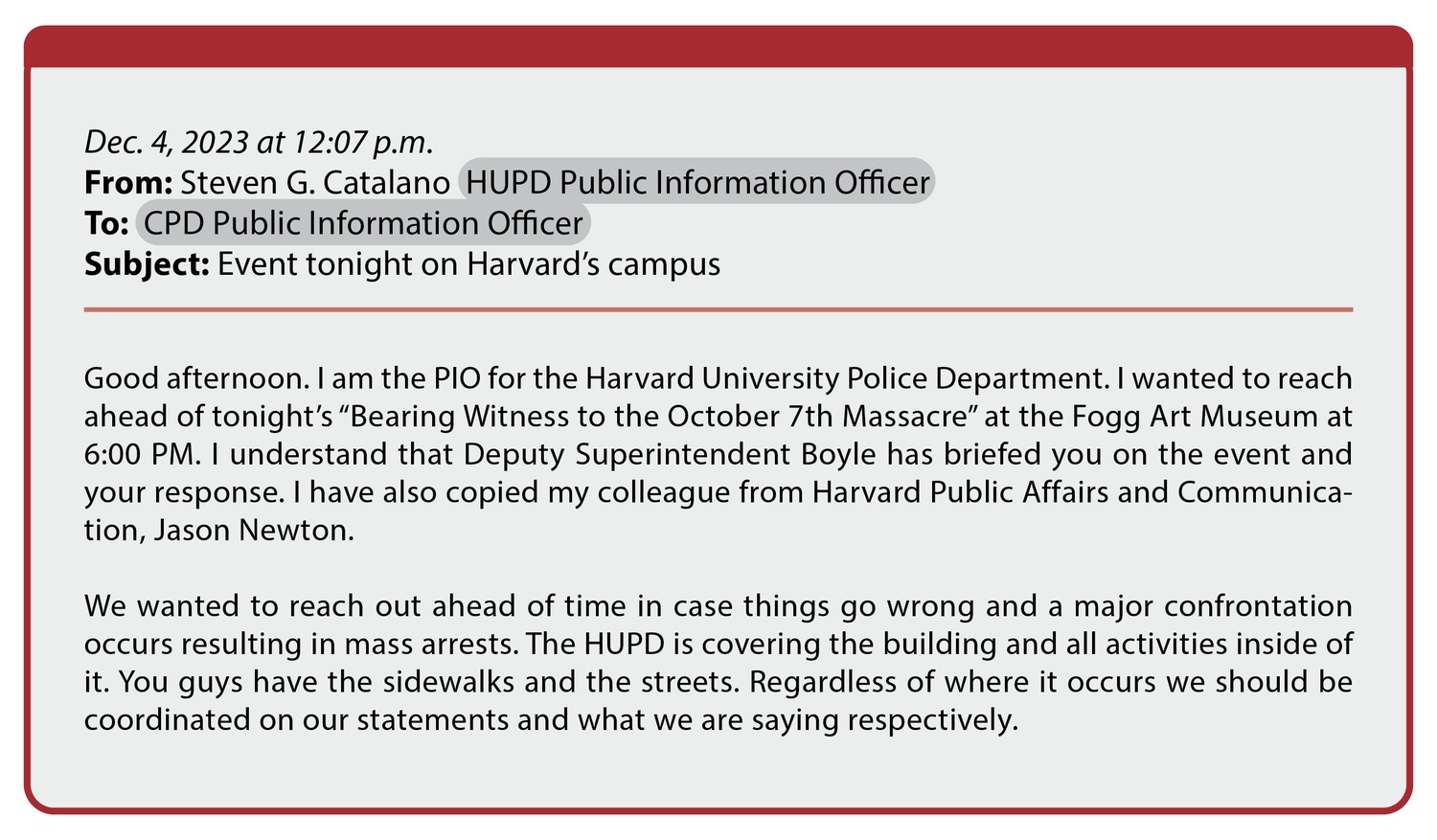
A Citywide Encampment Response
When pro-Palestine protesters encamped in Harvard Yard in late April, the University’s response became a matter of citywide discussion. The Cambridge City Council urged police to respect the rights of student protestors at MIT and Harvard. In private, city leaders met with Harvard police to discuss the ongoing protest.
A day before the encampment began, as similar protests spread across campuses nationwide, CPD commissioner Elow scheduled a meeting to discuss “recent incidents of pro-Palestinian protests/demonstrations on university campuses” with Clay and Thomas Lucey, Harvard’s director of community relations.
The meeting was set for April 26 — two days after the encampment started. Cambridge Mayor E. Denise Simmons, Cambridge City Manager Yi-An Huang ’05, and MIT police chief John DiFava were also invited to the meeting.
Shortly after the time of the scheduled meeting, Catalano sent an email to CPD deputy superintendent John W. Boyle requesting that the department “share any and all intelligence” with HUPD.
Email exchanges show that HUPD leadership were invited to meetings with their counterparts at CPD and MIT on at least five occasions during the pro-Palestine encampment in the Yard.
The departments then formed an “Encampment Working Group” with members from HUPD, CPD, Medford Police Department, Somerville Police Department, and the Tufts University and MIT Police Departments.
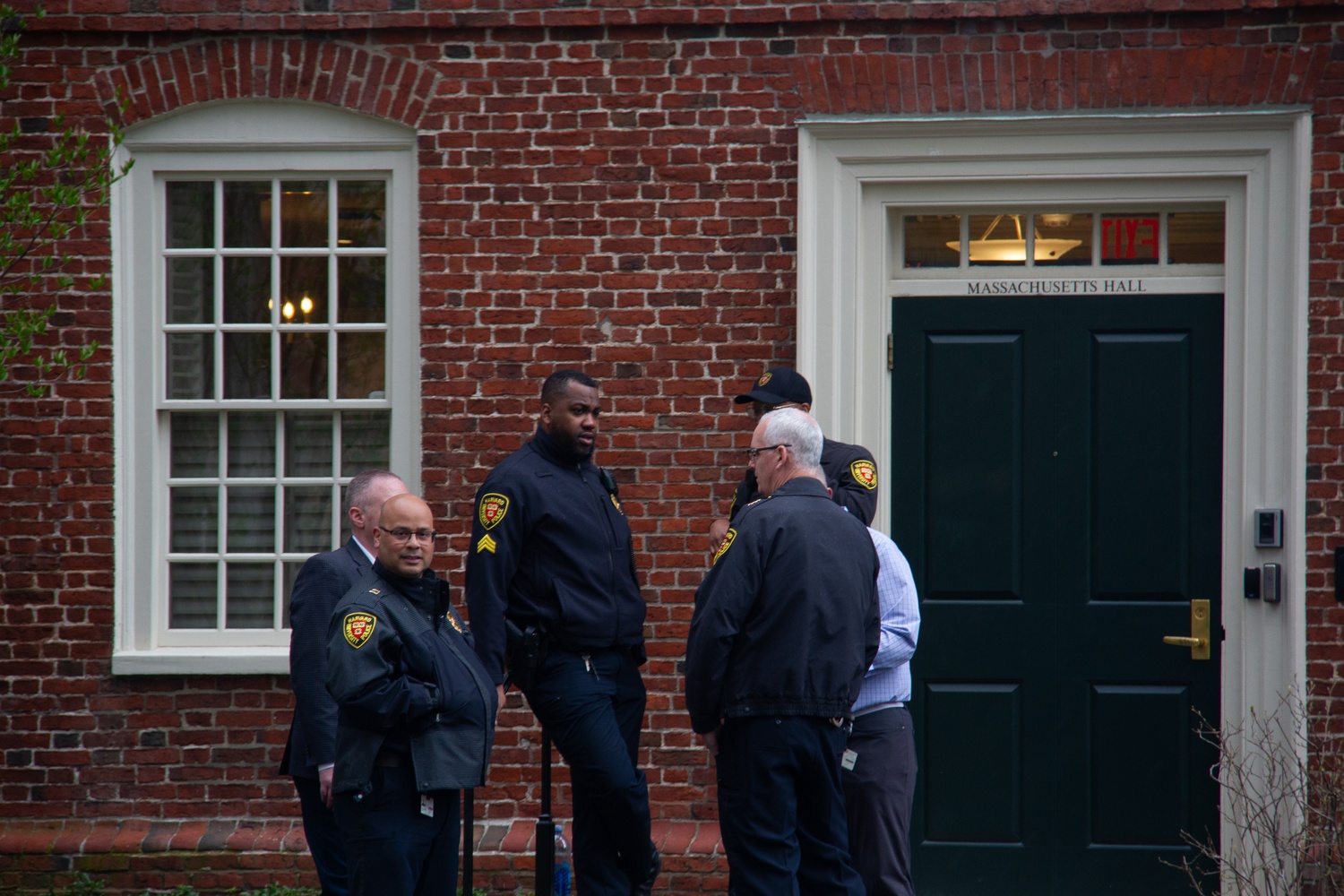
During the encampment, Catalano sent CPD multiple screenshots of social media posts from Harvard Out of Occupied Palestine and the Palestine Solidarity Committee, as well as a May 6 statement from Harvard President Alan M. Garber ’76 statement threatening encampment participants with involuntary leave.
The emails reviewed by The Crimson do not include any communication between Harvard and CPD officials about arresting student activists at the encampment. Though encampments elsewhere — including at MIT — ended in arrests, the emails also do not include any discussion of this possibility at Harvard.
In a statement to The Crimson, the PSC and HOOP wrote that University leadership should be “ashamed” of the monitoring.
“Surveilling and policing student vigils for murdered Palestinians is reprehensible, and simply continues Harvard’s long tradition of vilifying those who fight for justice,” they wrote in an email to The Crimson.
In an interview during the spring encampment, Clay called the demonstration “peaceful” and committed to protecting student’s right to protest.
HUPD did not arrest any students or University affiliates during the encampment. In May, however, two graduate students were charged with assault and battery over their involvement in a confrontation at an October 2023 demonstration at the Harvard Business School. Lawyers for the graduate students motioned to dismiss the case in November, alleging racially-biased policing from HUPD.
Eyes on the Internet
Following the encampment and through the start of the fall 2024 semester, HUPD and CPD consistently exchanged dates and times of protests and related screenshots of Instagram posts.
HUPD intelligence analyst Devi Vora monitored the social media accounts of several pro-Palestine groups — including Harvard Graduate Students for Palestine, the PSC, and HOOP — along with Harvard Chabad.
In one instance, Vora flagged a rally held in late May at the former Cambridge location of Elbit Systems.
“Flagging for situational awareness because Palestine Youth Movement is the organizer and this is likely to draw a large crowd bent on vandalism and potential violence, as in the past,” Vora wrote. “Harvard affiliates may join. I will continue to monitor for such details.”
The Palestinian Youth Movement did not respond to a request for comment.
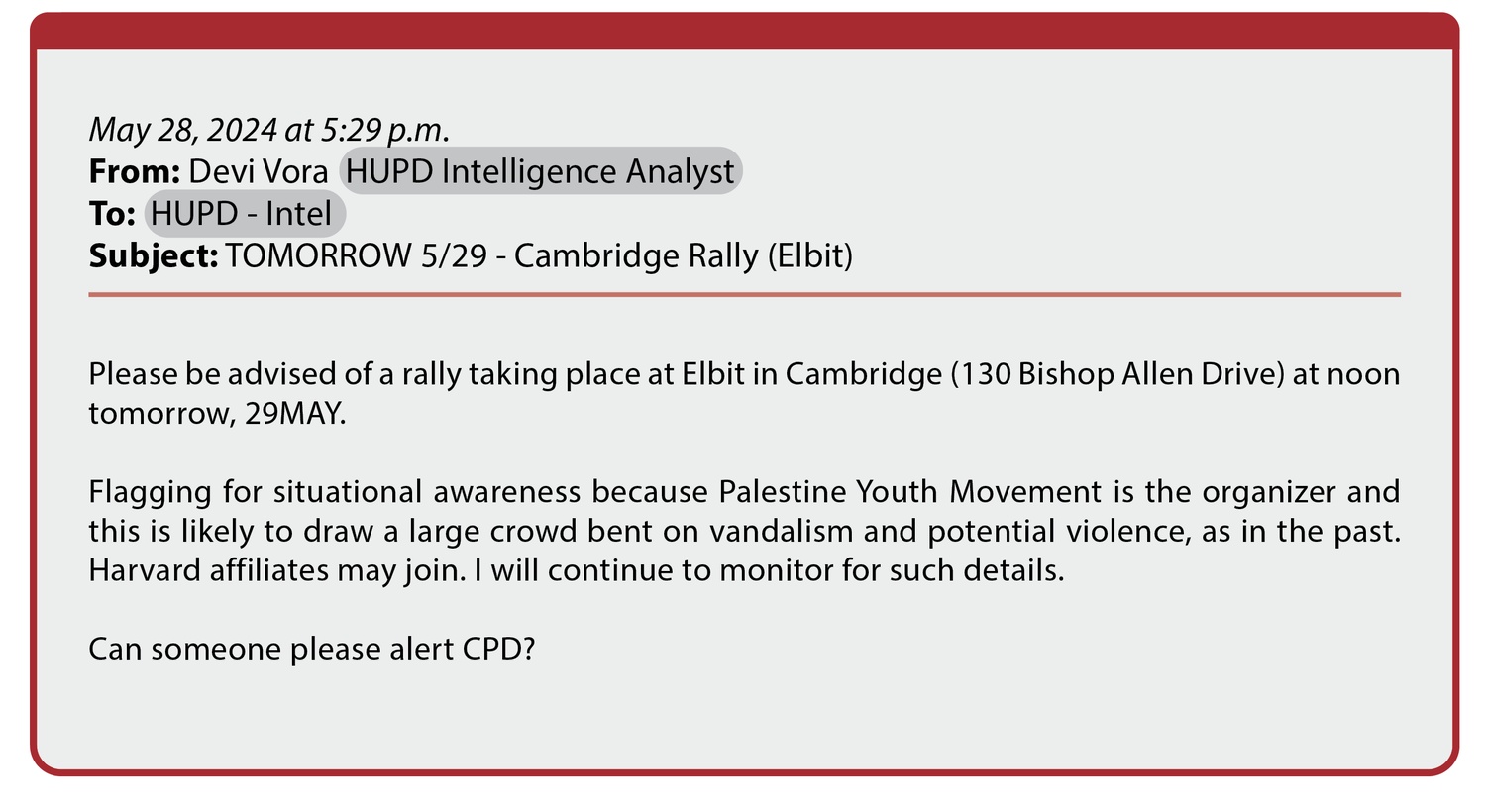
Vora also flagged a June 24 “intro to direct action” training held at the Democracy Center, a meeting place for activist groups in Harvard Square. In an email to HUPD leaders that was forwarded to CPD’s Crime Analysis Unit, Vora cited the “subject matter” of the training and the anticipated presence of pro-Palestine organizers.
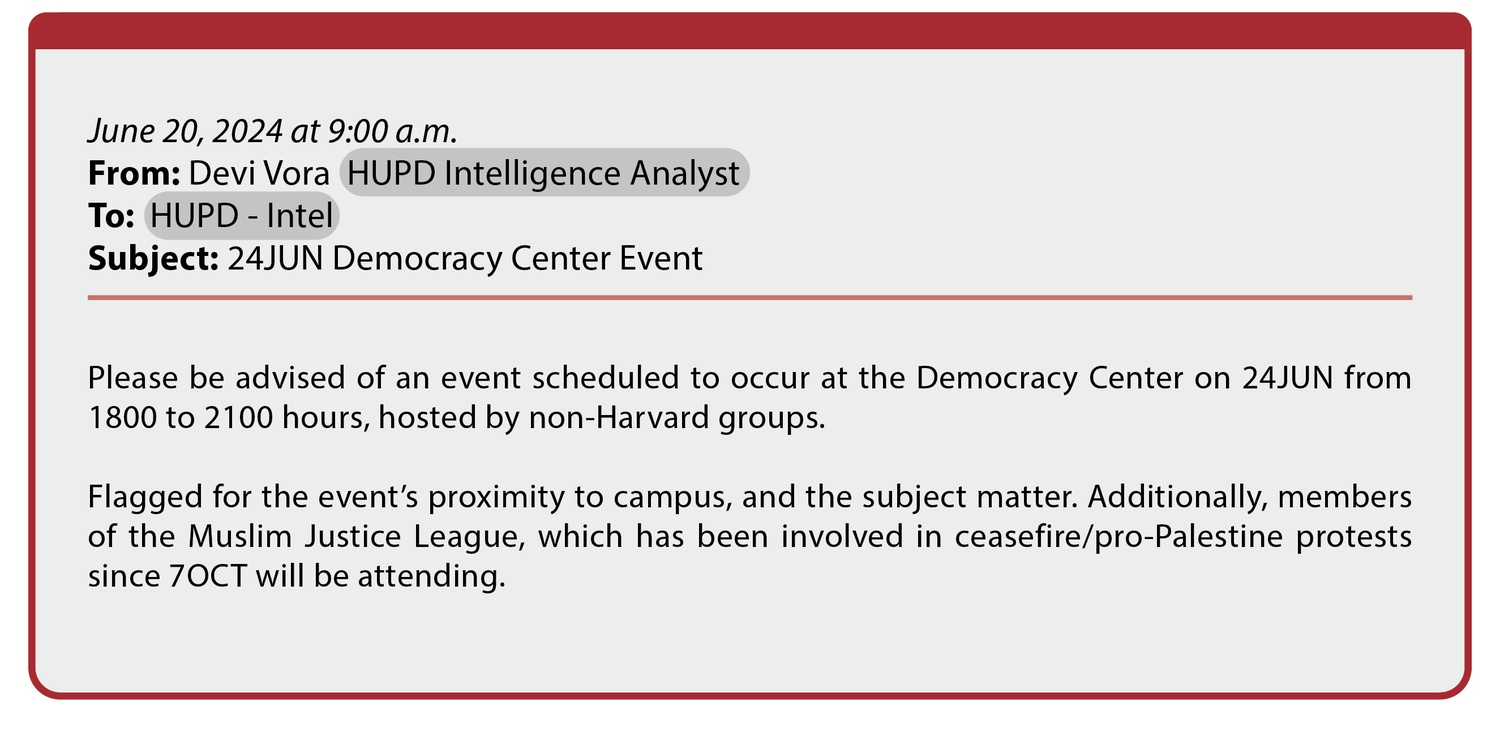
In several cases, HUPD flagged the possibility that events — including an April town hall held by Harvard Corporation members and a zoning appeal hearing for Harvard Chabad — might draw demonstrations. No demonstrations occurred outside the town hall or surrounding the virtual Chabad hearing.
While anticipated pro-Palestine protests dominated the interdepartmental communications, several unrelated events were flagged including a PETA protest in early August outside of Johnston gate. HUPD also gathered and shared nine pages of intelligence information about Fossil Fuel Divest Harvard in the week prior to a Reclaim Earth Day protest in April attended by just over a dozen affiliates.
“We have intelligence that Fossil Fuel Divest Harvard tends to include people not affiliated with Harvard, usually has a list of demands, and can draw a large group,” the email read.
Out of the 32 events communicated between the departments, all except four were set to take place within CPD’s jurisdiction. While HUPD has jurisdiction over any incident on Harvard’s campus, areas adjacent to campus — such as city streets or the Science Center Plaza — are policed by CPD.
In an interview shortly after the start of the encampment, Clay said that HUPD and CPD often collaborate when incidents involving Harvard affiliates take place off Harvard’s campus.
“We have a line of communication, we talk frequently,” he said. “We have an agreement where we will support one another — but if it’s Harvard-related, Harvard University Police Department takes the lead.”
—Staff writer Sally E. Edwards can be reached at sally.edwards@thecrimson.com. Follow her on X @sallyedwards04 or on Threads @sally_edwards06.
—Staff writer Asher J. Montgomery can be reached at asher.montgomery@thecrimson.com. Follow her on X @asherjmont or on Threads @asher_montgomery.
